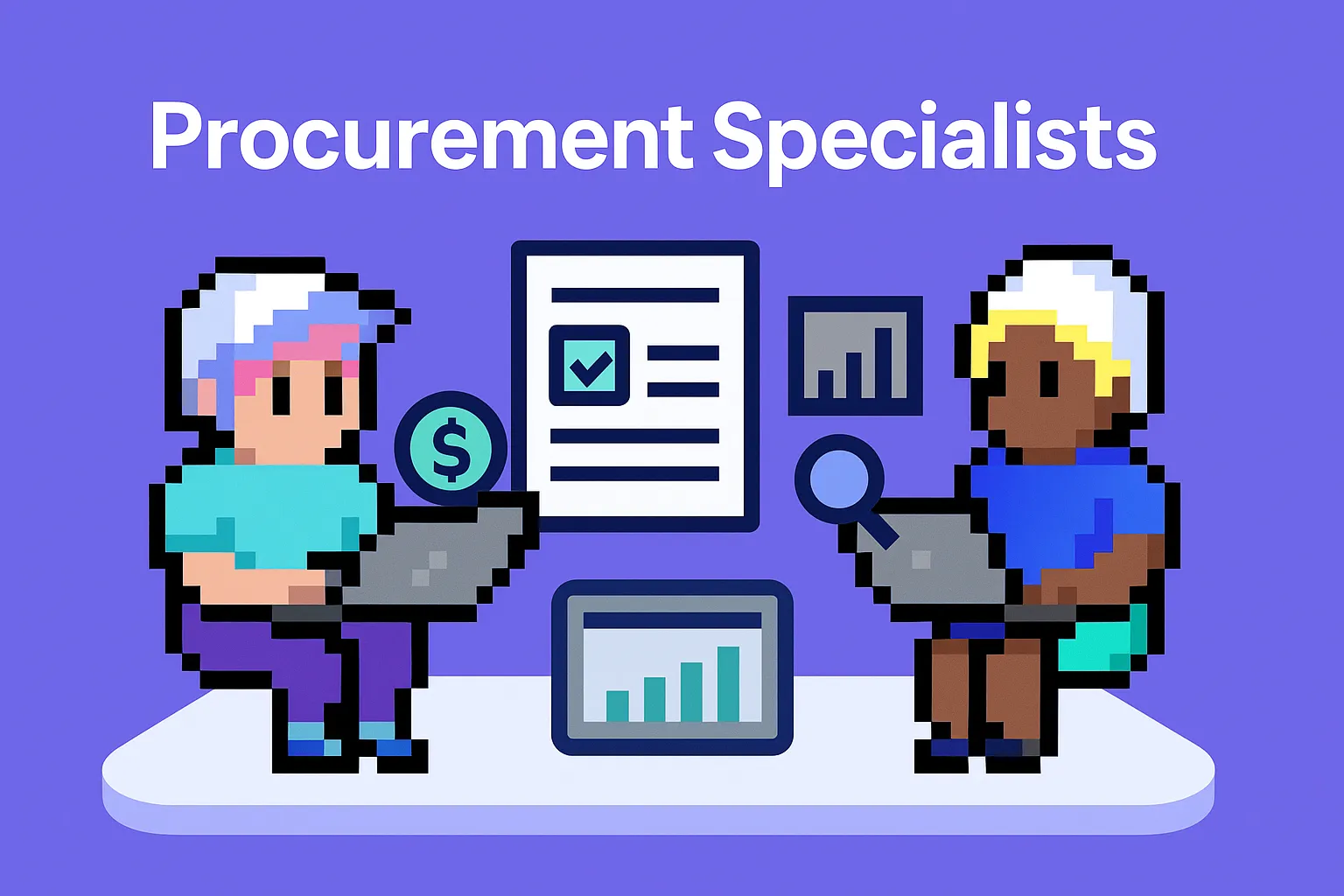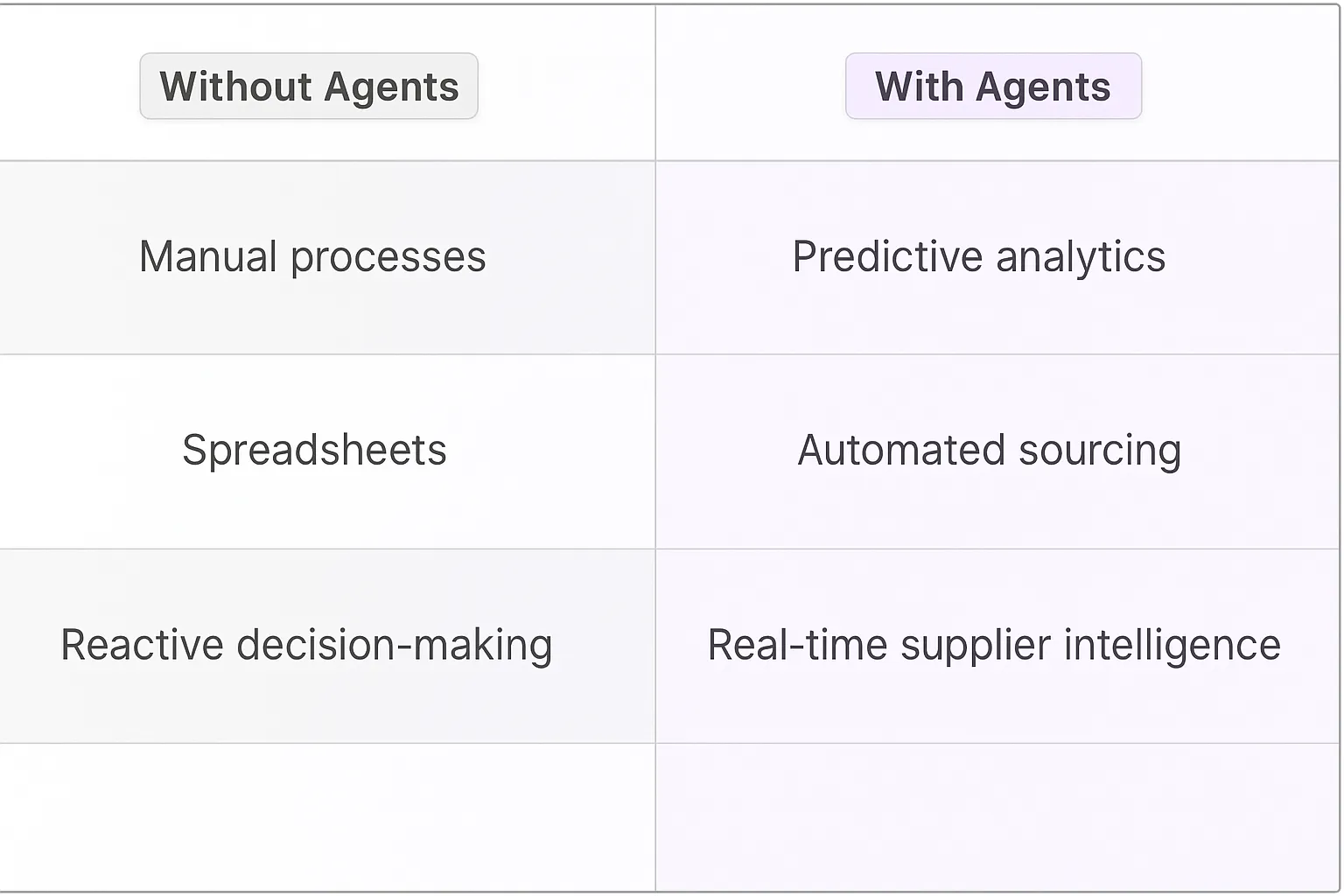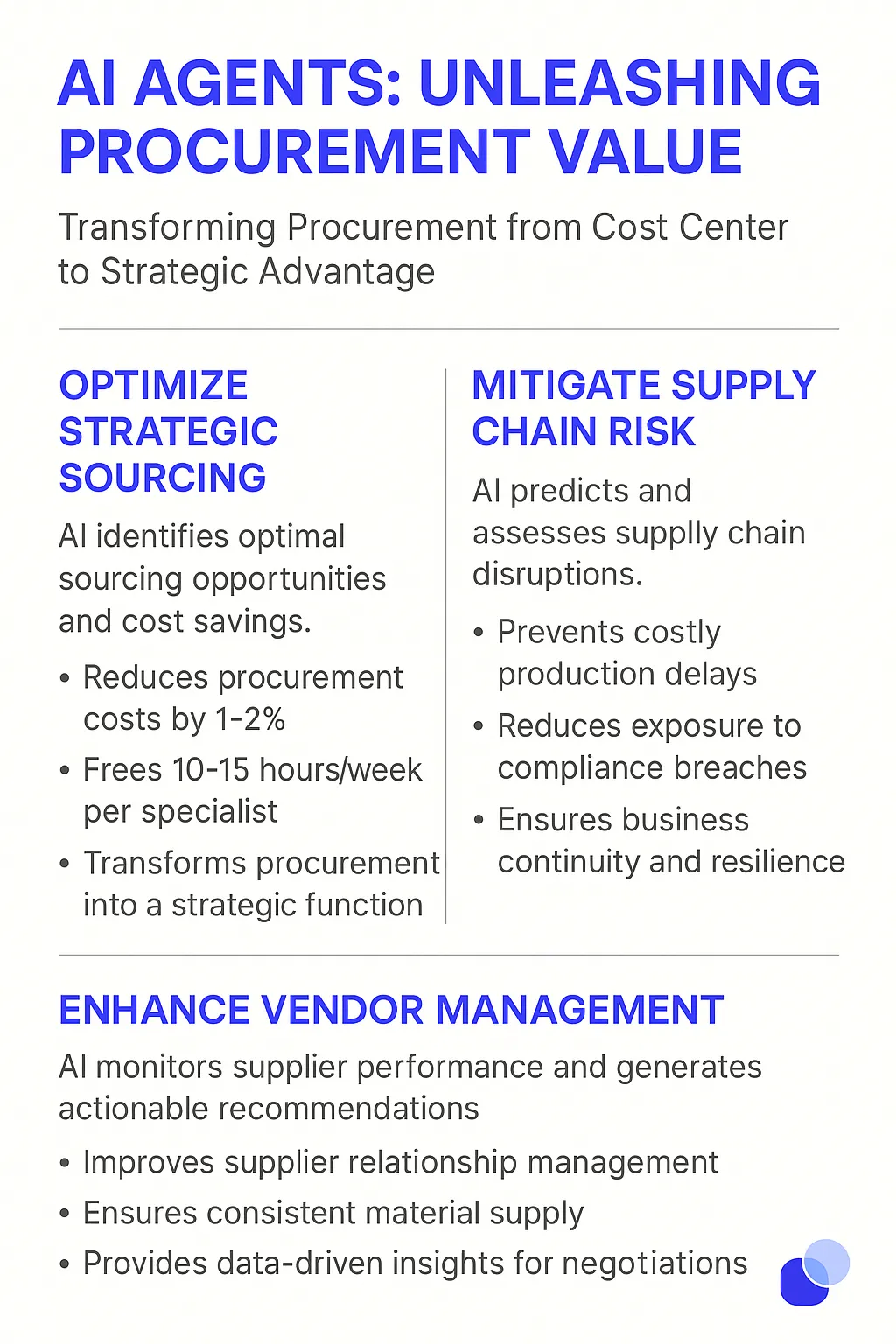A Procurement Specialist is a professional responsible for sourcing, negotiating, and purchasing goods and services for an organization. They play a crucial role in managing supplier relationships, optimizing costs, and ensuring the smooth flow of materials and services. In the age of AI, these specialists are evolving into strategic decision-makers, leveraging advanced technologies to drive value and efficiency in the procurement process.

Before AI agents entered the procurement scene, specialists relied on a hodgepodge of legacy systems, spreadsheets, and manual processes. It was like trying to navigate a complex maze blindfolded while juggling flaming torches. Procurement teams spent countless hours sifting through supplier databases, negotiating contracts, and managing inventory levels. The result? A slow, error-prone process that often left businesses vulnerable to supply chain disruptions and missed opportunities.
Enter AI agents – the game-changers of the procurement world. These digital teammates are like having a team of procurement savants working 24/7, never needing coffee breaks or vacation time. Here's why they're transforming the landscape:
The bottom line? AI agents are turning procurement specialists into strategic powerhouses. They're not just improving efficiency; they're fundamentally reshaping how businesses approach supply chain management. In a world where agility and resilience are currency, AI agents are the secret sauce that's giving procurement teams an unfair advantage. And trust me, in this game, you want every advantage you can get.

Procurement specialists are the unsung heroes of business operations, navigating complex supply chains and vendor relationships. AI agents are poised to transform this role, acting as digital teammates that augment human capabilities. These AI-powered allies can sift through vast amounts of data, identify patterns, and provide insights that would take humans days or weeks to uncover.
One key process where AI agents shine is supplier evaluation. They can analyze historical performance data, financial reports, and market trends to create comprehensive supplier scorecards. This enables procurement specialists to make data-driven decisions about which vendors to partner with, reducing risk and improving overall supply chain resilience.
Another critical process is contract management. AI agents can review complex legal documents, flagging potential issues and suggesting optimizations. They can also track contract expiration dates and performance metrics, ensuring that procurement specialists never miss an opportunity to renegotiate terms or switch to a more favorable supplier.
On a day-to-day basis, AI agents can tackle a variety of tasks that free up procurement specialists to focus on strategic initiatives. For instance, they can automate purchase order creation by analyzing historical data and current inventory levels. This not only saves time but also helps optimize stock levels and reduce carrying costs.
AI agents can also assist with spend analysis, categorizing expenses and identifying areas for potential cost savings. They can detect maverick spending patterns and suggest ways to consolidate purchases for better negotiating power.
In the realm of supplier communication, AI agents can draft initial correspondence, schedule meetings, and even conduct preliminary negotiations based on predefined parameters. This allows procurement specialists to step in only when human judgment and relationship-building skills are truly needed.
Perhaps most excitingly, AI agents can serve as real-time market intelligence gatherers. They can monitor news feeds, social media, and industry reports to alert procurement specialists about supply chain disruptions, price fluctuations, or emerging alternatives to current suppliers. This proactive approach enables businesses to stay ahead of potential challenges and capitalize on new opportunities.
The integration of AI agents into procurement processes represents a fundamental shift in how businesses approach supply chain management. It's not about replacing human expertise, but rather augmenting it with superhuman data processing capabilities. As these digital teammates become more sophisticated, we'll likely see procurement specialists evolve into strategic supply chain architects, leveraging AI to create more resilient, efficient, and innovative business operations.

Procurement specialist AI agents are reshaping how businesses approach their purchasing processes. These digital teammates bring a level of efficiency and insight that's transforming industries across the board. Let's dive into some specific scenarios where these AI-powered procurement specialists are making waves.
From manufacturing to healthcare, these AI agents are proving their worth by tackling complex supply chain challenges, optimizing vendor relationships, and driving cost savings. They're not just tools; they're becoming integral parts of procurement teams, offering round-the-clock support and data-driven decision-making capabilities.
What's particularly exciting is how these AI agents adapt to the unique needs of each industry. They're not one-size-fits-all solutions, but rather highly specialized digital teammates that can be tailored to the specific demands of different sectors. This versatility is key to their growing adoption and impact.
In the following examples, we'll explore how procurement specialist AI agents are being leveraged in various industries, showcasing their ability to enhance efficiency, reduce costs, and drive innovation in purchasing processes.
The manufacturing industry is ripe for a procurement revolution, and AI agents are leading the charge. In the high-stakes world of just-in-time production, where inventory costs can make or break a company, Procurement Specialist AI agents are becoming the unsung heroes of the factory floor.
These digital teammates are not just glorified spreadsheets; they're sophisticated market analysts, negotiators, and supply chain orchestrators. They're constantly scanning global markets, predicting price fluctuations, and identifying potential supply disruptions before they happen. It's like having a procurement savant who never sleeps, never takes a coffee break, and has perfect recall of every transaction and market trend.
But here's where it gets really interesting: these AI agents are learning to play the long game. They're not just looking for the lowest price today; they're building relationships with suppliers, analyzing their reliability, and even factoring in geopolitical risks. They're essentially creating a dynamic, multi-dimensional model of the entire supply ecosystem.
For a car manufacturer, this could mean the difference between a smooth production run and a costly shutdown. The AI might notice that a key supplier of microchips is located in a region prone to natural disasters. It could then proactively suggest diversifying suppliers or increasing buffer stock for that particular component. This level of foresight and strategic thinking was once the domain of seasoned procurement executives. Now, it's happening in milliseconds, 24/7.
The real kicker? These AI agents are getting better at negotiation. They're not just comparing prices; they're crafting win-win scenarios that benefit both the manufacturer and the supplier. They might suggest bulk purchases in exchange for priority shipping, or offer longer-term contracts for price stability. It's like having a master negotiator who also happens to have perfect information about market conditions and your company's needs.
As these AI agents become more sophisticated, we're going to see a shift in the role of human procurement specialists. They'll become strategic overseers, focusing on relationship-building and high-level decision-making, while the AI handles the day-to-day grunt work. It's not about replacing humans; it's about augmenting them to create a procurement powerhouse that can navigate the complexities of global supply chains with unprecedented agility and insight.
The manufacturing industry is just the beginning. As these AI procurement specialists prove their worth on the factory floor, expect to see them proliferate across industries, reshaping how businesses interact with their suppliers and fundamentally altering the dynamics of global trade. Welcome to the era of AI-driven strategic procurement.
The construction industry is about to experience a seismic shift in procurement, and AI agents are the catalysts. We're talking about an industry where a single day's delay can cost millions, and where the complexity of mega projects like skyscrapers or infrastructure developments can make your head spin. Enter the Procurement Specialist AI agent - the unsung hero of tomorrow's skylines.
These digital teammates are not just fancy calculators; they're becoming the master conductors of a chaotic symphony of suppliers, materials, and timelines. They're constantly analyzing market conditions, predicting material shortages, and optimizing delivery schedules with a level of precision that would make a Swiss watchmaker jealous.
But here's where it gets really interesting: these AI agents are starting to think like seasoned project managers. They're not just looking at immediate costs; they're considering long-term durability, sustainability, and even the potential for future retrofitting. Imagine an AI that suggests using a slightly more expensive but more durable steel alloy because it predicts stricter building codes in the next decade. That's next-level foresight that can save billions in the long run.
For a company working on a mega project like a new airport, this AI could be the difference between a smooth execution and a PR nightmare. It might notice that the planned concrete supplier is located in an area prone to labor strikes. The AI could then proactively suggest splitting the order between multiple suppliers or negotiating clauses to mitigate potential disruptions. This kind of strategic thinking used to be the domain of grizzled construction veterans. Now, it's happening in real-time, 24/7.
The real game-changer? These AI agents are becoming masters of the art of the deal. They're not just comparing quotes; they're crafting complex, multi-party agreements that optimize for cost, time, and risk. They might suggest pooling orders with other nearby projects to leverage bulk discounts, or propose innovative payment structures that align incentives across the supply chain. It's like having a team of hardball negotiators who also happen to have perfect information about market trends and your project's evolving needs.
As these AI agents evolve, we're going to see a transformation in the role of human procurement specialists in construction. They'll become strategic visionaries, focusing on relationship-building and high-stakes decision-making, while the AI handles the intricate dance of day-to-day procurement. It's not about replacing humans; it's about creating a procurement powerhouse that can navigate the labyrinth of global supply chains and local regulations with unprecedented agility.
The construction industry is just the beginning. As these AI procurement specialists prove their worth on mega projects, expect to see them reshape how businesses approach large-scale endeavors across industries. We're entering an era where AI-driven strategic procurement isn't just a competitive advantage - it's the price of admission to the big leagues of global development.
Implementing a Procurement Specialist AI Agent isn't just about plugging in some fancy algorithm and watching the magic happen. It's a complex dance of data, integration, and machine learning that can make even seasoned tech veterans break out in a cold sweat.
First off, you're dealing with a data beast. Procurement involves a massive amount of information - supplier details, pricing structures, contract terms, inventory levels, and market trends. Your AI needs to ingest, process, and make sense of this data tsunami. It's like trying to drink from a fire hose while solving a Rubik's cube.
Then there's the integration nightmare. Your Procurement AI isn't an island; it needs to play nice with your existing systems. ERP, CRM, inventory management - they all need to shake hands and share data seamlessly. It's like organizing a United Nations meeting where every system speaks a different language.
Let's not forget about the machine learning challenges. Training your AI to make smart procurement decisions is no walk in the park. It needs to understand nuanced factors like supplier reliability, quality consistency, and even geopolitical risks. You're essentially trying to teach a computer to think like a seasoned procurement pro with decades of experience.
On the operational front, implementing a Procurement AI is like trying to change the tires on a moving car. Your procurement processes don't just stop while you're setting up your new digital teammate.
Change management is a beast. You've got procurement teams who've been doing things their way for years. Now you're asking them to trust an AI to make decisions that could impact millions in spending. It's like telling a chef to let a robot cook their signature dish.
Then there's the skill gap. Your team needs to level up to work effectively with AI. They need to understand how to interpret AI recommendations, when to override them, and how to fine-tune the system. It's like asking your procurement team to become part-time data scientists overnight.
Don't underestimate the governance headache either. Who's responsible when the AI makes a bad call? How do you ensure transparency and auditability in AI-driven decisions? You're navigating a regulatory minefield while trying to maintain the agility that AI promises.
Lastly, there's the ROI pressure. AI implementations aren't cheap, and procurement is all about saving money. You need to prove that your shiny new AI is actually delivering value, not just making fancy charts. It's a high-stakes game of show-and-tell with the C-suite watching closely.
Implementing a Procurement Specialist AI Agent is a journey filled with technical hurdles and operational gymnastics. But for those who can navigate these challenges, the potential for transformation is massive. It's not just about cost savings; it's about elevating procurement from a back-office function to a strategic powerhouse.
The integration of AI agents in procurement is not just a trend; it's a paradigm shift. These digital teammates are redefining the role of procurement specialists, transforming them from tactical buyers into strategic value creators. By automating routine tasks, providing deep market insights, and enabling data-driven decision-making, AI agents are unlocking new levels of efficiency and effectiveness in procurement processes.
However, the journey isn't without challenges. From technical hurdles in data integration to operational challenges in change management, organizations must navigate a complex landscape to fully harness the power of AI in procurement. But for those who successfully implement these solutions, the rewards are substantial – increased agility, reduced costs, and a more resilient supply chain.
As we look to the future, it's clear that the synergy between human expertise and AI capabilities will be the key to success in procurement. The procurement specialists who thrive will be those who can effectively collaborate with their AI counterparts, leveraging technology to amplify their strategic impact on the organization. In this new era of AI-powered procurement, the possibilities are limitless for those ready to embrace the change.